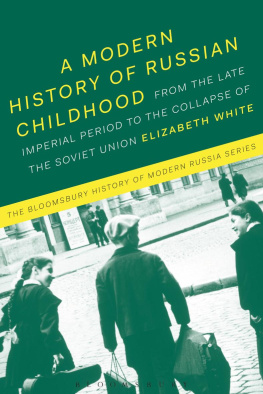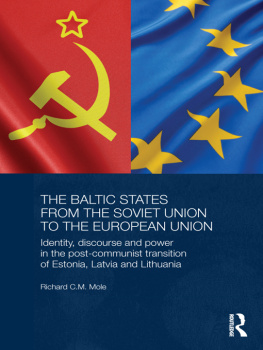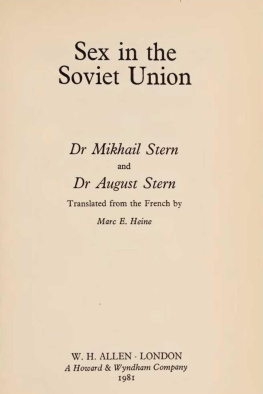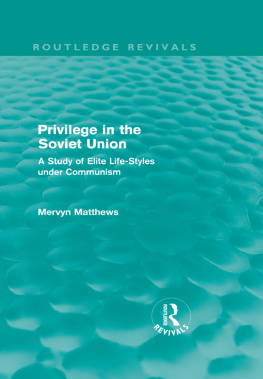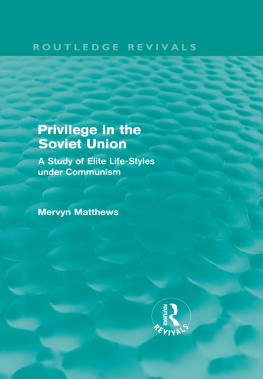SOCIOLOGY IN THE SOVIET UNION AND BEYOND
To my family
With love and hope for the future
Sociology in the Soviet Union and Beyond
Social Enquiry and Social Change
Elizabeth A. Weinberg
Department of Sociology
London School of Economics
First published 2004 by Ashgate Publishing
Reissued 2018 by Routledge
2 Park Square, Milton Park, Abingdon, Oxon OX14 4RN
711 Third Avenue, New York, NY 10017, USA
Routledge is an imprint of the Taylor & Francis Group, an informa business
Elizabeth A. Weinberg 2004
Elizabeth A. Weinberg has asserted her right under the Copyright, Designs and Patents Act, 1988, to be identified as the author of this work.
All rights reserved. No part of this book may be reprinted or reproduced or utilised in any form or by any electronic, mechanical, or other means, now known or hereafter invented, including photocopying and recording, or in any information storage or retrieval system, without permission in writing from the publishers.
A Library of Congress record exists under LC control number: 2003063799
Notice:
Product or corporate names may be trademarks or registered trademarks, and are used only for identification and explanation without intent to infringe.
Publisher's Note
The publisher has gone to great lengths to ensure the quality of this reprint but points out that some imperfections in the original copies may be apparent.
Disclaimer
The publisher has made every effort to trace copyright holders and welcomes correspondence from those they have been unable to contact.
ISBN 13: 978-0-815-39714-4 (hbk)
ISBN 13: 978-1-351-14880-1 (ebk)
I wish to thank Suzanne Keller for initially stimulating my interest in the sociology of knowledge, Ithiel deSola Pool and Celia Heller for directing my early attempts to understand Soviet sociology and Gayle Durham Hollander for initiating me into the world of Soviet source materials. I owe special debts of gratitude to Merle Fainsod who guided my master's dissertation on Soviet public opinion research and Leonard Schapiro for his valuable assistance as my graduate supervisor. Eleanora Gottlieb helped me in many ways, not least in grappling with the complexities of the Russian language.
In this second edition, I want to acknowledge my graduate students interest in the area especially Sarah Amsler who also helped with translating some of the material. I am indebted to Stephen White who warmly supported the idea of a revised edition and Jenny Law who so congenially and efficiently prepared the final manuscript with the unstinting and patient help of Alma Gibbons. I am also grateful to Soviet and Russian colleagues for encouraging me to publish a second edition so that they could read a less biased interpretation of the development of sociology in the former Soviet Union. Finally, my greatest thanks go to Angus Stewart for all of his advice and continuous encouragement in my many varied projects.
- CDSP Current Digest of the Soviet Press
- Fil Nauki Filosofskie Nauki (Nauchnye doklady vysshei shkoly)
- Vestnik AN SSSR Vestnik Akademii Nauki SSSR
- VestnikLGU Vestnik Leningradskogo Universiteta: Seriia Ekonomiki, Filosofii, Prava
- Vestnik MGU Vestnik Moskovskogo Universiteta: Seriia VIIIEkonomika, Filosofiia
- Vop Fil Voprosy Filosofii
The origins of the present study lie in the intersection of two areas of interest, the historical and social circumstances surrounding the development of sociology (or rather, sociologies) in different societies, and a specific 'area' of concern with the social structure and dynamics of the Soviet Union. My initial exposure to the issues and problems raised by a sociological analysis of Soviet society took place very much at the same time that the first post-'thaw' products of a reviving sociology in the Soviet Union were beginning to emerge. In addition to an interest in research findings in particular areas, there emerged a general concern with the obstacles to and the mechanisms of the acceptance of sociological enquiry in a society formally founded on the principle of planned social change through the agency of a centralized political apparatus.
Within this context, therefore, the following is a case study in the institutionalization of a discipline in a particular society. As it happened, the historical period with which the bulk of this study is broadly concerned - that of the 1960s - was characterized by a developing interest in the problematic, contingent nature of sociological enquiry in Western societies and in the social uses which that enquiry was meant to serve. In general, the consequence has been to make clear that the 'unique' situation of Soviet sociology was more apparent than real. However, given the historical significance of the Soviet Union, an interest in the manner in which sociological enquiry has been legitimated there has continuing relevance.
Given its central focus on the problem of legitimation, the present study does not attempt a systematic assessment of the findings of Soviet sociologists. Further, it is recognized that much work, either directly sociological or relevant to sociologists, was produced in the Soviet Union by individuals and groups not calling themselves sociologists, but operating within the context of other disciplines. The assumption is made, however, that such work did not contribute directly to the institutionalization of sociology as a separate discipline. Because the focus is on the emergence of a discipline within an institutional context, the criterion for sociology is that those who produce it call themselves sociologists.
traces in depth the development of an area of particular significance in Soviet sociology, public opinion research. Since its initiation in 1960, the expansion and improvement of such research in a period of liberalization reflected the increasingly pragmatic trend in sociology, the growing belief among decision-makers in the functional value of such research and the greater acceptance of sociological research by the country at large. At the same time, such research affords an excellent opportunity of chronologically tracing changes in the presentation, the research methods and the approach to this type of research.
, originally published in the British Journal of Sociology (Vol. 43 (1) March 1992), looks at the role played by Soviet sociologists in initiating and critiquing the processes of perestroika and glasnost. The final chapter discusses the institutionalization of knowledge, detailing sociology's fight for legitimacy, the obstacles the discipline faced and the limits of the Soviet system up to and including glasnost and perestroika. In the light of the demise of the Soviet Union, the last chapter looks finally at the future of the newly evolving Russian sociology.
A few words seem necessary about some technicalities. A glossary of Russian terms appears at the end of the text. All of the words in it follow Russian spelling rules (e.g. the plural of vuz is vuzy). There are some Russian words, however, which are today quite common in English (e.g. komsomol). They are not italicized in the text, and their plurals follow English spelling rules. The Library of Congress system of transliteration has been adopted. I have also followed the Soviet practice of transposing pre-1917 orthography into new.




